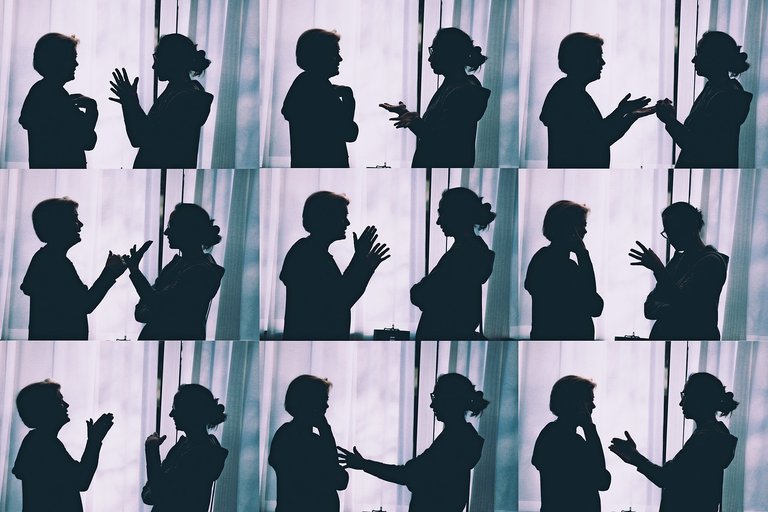To be silent or not to be silent, that is the question / Callar o no callar, he ahí el asunto (eng-esp)
Hello, friends of Holos and Lotus. I'd like to join @emiliorios' initiative to talk about the law of silence.
To give my opinion, I'm going to rely on the article Emilio suggested by psychologist Marta Bueno.
Marta Bueno says in her article:
No one doubts that the best way to resolve conflicts is through dialogue. Using silence as a tactic to avoid effective communication is a passive/aggressive way of handling conflict situations and resolves nothing.
She then tells us:
People who use silence as a response usually do so because they have no other psychological resources to deal with the situation. Silence is their recourse because they believe their interlocutor isn't listening, that they aren't open to their point of view, and thus they force them to pay attention. They think the other person should apologize for their attitude or their words, and they use silence as a warning. They believe there's no point in talking about the issue because they won't be able to reach an agreement. They feel deeply offended, but they don't want to admit it, and keeping quiet will make the other person regret it. They don't want to address the issue, and their silence makes it clear that they're not going to do it now, not ever.
It is said that music is the correct combination of sounds and beats. According to Wikipedia, it is the art of creating and organizing sounds and silences.
Either concept serves to support my opinion on this topic. And by that, I mean that in this sense we cannot be absolute. In fact, neither in this sense nor in any other.
We can always absolutize something and err.
That's why I say that sometimes it's better to remain silent, while other times it's necessary to speak.
You just have to learn to choose when to do each thing.
Without a doubt, the best way to resolve a conflict is through conversation. In interpersonal relationships, communication and dialogue are essential. It's very difficult to have a good relationship without dialogue and communication.
However, when we're angry, dialogue tends to be quite counterproductive.
In other words, sometimes it's better to keep quiet than to say something we might regret later. In other words, at that moment, I think staying quiet is the smartest thing we can do.
That's why I agree with Marta's first point; but I completely disagree with the second point I mentioned.
Of course, I understand what the author of the article means when she talks about silence as a protest, or when she refers to people who decide to silence themselves or others. In other words, ignore other people.
In the cases she mentions, she's right. But that's not always the case.
On the one hand, there's the fact that when we get angry, we may say hurtful things, exaggerate, take things out of context, or simply not want to give in.
It's no secret that anger clouds understanding. So when we're angry, we may not properly reason about what happened or what future actions we'll take.
In that case, it's better to remain silent, let time pass, and then, with a cool head, look at things from another perspective.
That doesn't mean ignoring others or using silence as a protest; it's simply choosing silence not as a weapon but as a tool for conflict resolution.
Even if I have to ignore what my interlocutor says or does in order not to worsen the situation and then look for a way out to save the relationship, I see that silence, that icy treatment, as valid and necessary.
Just use common sense.
On the other hand, we must learn to choose our battles. We must know when it's worth fighting to save a relationship or when it's better to apply the whip of indifference. That is, ignore the problem or the person causing it.
There are times when some people provoke us with comments or actions in an attempt to get us to react accordingly. However, no matter how much we want to do it in those situations, sometimes it's better to remain silent and ignore. Apply the Buddhist concept of letting go.
To break the silence and speak, we need to ask ourselves a few questions:
Is it worth it?
Will it solve anything?
Will it make me or someone else happy?
Is the other person worth it?
There are times when the skill of silent treatment can be beneficial and the best option for our psyche and the most effective response to avoid greater evils.
Of course, silence, ignoring someone, and silent treatment can't be the answer to everything.
I repeat: you have to use common sense.
Because there are times when we shouldn't stay silent. I believe it's better to blush once than to blush forever.
What I mean by this is that, even if we use silence to wait for the disagreement to pass, if we later decide it's worth saving the relationship, it's better to say things head-on, no matter how difficult they may be, than to ignore the problem that caused the argument.
We have to face the situation head-on. And the best way is through conversation.
In short, we must analyze each situation to know when it is best to remain silent and when it is necessary to speak the truth head-on and without fear.
*Versión en español"
Hola amigos de holos y Lotus. Me quiero unir a la iniciativa de @emiliorios para hablar sobre la ley de hielo o el silencio.
Para dar mi opinión me voy a apoyar en el artículo que emilio nos sugirió de la psicóloga Marta Bueno.
Dice Marta Bueno en su artículo:
Nadie duda de que lo mejor para resolver los conflictos es el diálogo. Usar el silencio como táctica para evitar una comunicación eficaz es una manera pasiva/agresiva de manejar situaciones conflictivas y no resuelve nada.
Luego nos dice:
La persona que utiliza el silencio como respuesta suele hacerlo porque no tiene otros recursos psicológicos para hacer frente a la situación. El silencio es su recurso porque cree que su interlocutor no lo escucha, que no está abierto a su punto de vista y así le obliga a prestarle atención, piensa que el otro debe disculparse por su actitud o sus palabras, y utiliza el silencio como advertencia, cree que no tiene sentido hablar del tema porque no podrá llegar a un acuerdo, se siente profundamente ofendido, pero no quiere reconocerlo y callándose hará que el otro se arrepienta, no quiere tratar el tema y con el silencio queda claro que ni ahora ni nunca.
Se dice que la música es la correcta combinación de sonidos y los tiempos. Según Wikipedia es el arte de crear y organizar sonidos y silencios.
Cualquiera de los dos conceptos me sirven para apoyar mi opinión sobre este tema. Y con eso me refiero a que en este sentido no podemos ser absolutos. De hecho ni en este sentido ni en ningún otro.
Siempre absoluticemos algo podemos pecar de equivocarnos.
Por eso digo que en ocasiones es preferible callar mientras que en otras es necesario hablar.
Solamente hay que aprender a elegir cuándo hacer cada cosa.
Sin duda alguna la mejor forma de resolver un conflicto es conversando. En las relaciones interpersonales la comunicación y el diálogo son primordiales. Es muy difícil que exista una buena relación si no hay diálogo, comunicación.
Sin embargo cuando estamos enojados los diálogos suelen ser bastante contraproducentes.
O sea, a veces es mejor callarse antes que decir algo de lo que podamos lamentar luego. O sea, en ese momento, pienso que callar es lo más inteligente que podemos hacer.
Por eso estoy de acuerdo en lo primero que plantea Marta; pero totalmente en desacuerdo con el segundo punto que les mencioné.
Por supuesto entiendo a lo que se refiere la autora del artículo cuando habla de El silencio como protesta o cuando se refiere a personas que deciden silenciarse o silenciar a otros. O sea ignorar a otras personas.
En los casos que ella menciona, tiene razón lo que dice. Pero no siempre es así.
Por un lado está el hecho de que nosotros cuando nos enojamos podemos decir cosas hirientes hiperbolizar, sacar cosas de contexto o, simplemente, no querer dale el brazo a torcer.
Para nadie es un secreto que la ira nubla el entendimiento. De modo que cuando estamos enojados quizás no razonemos correctamente lo sucedido o las acciones futuras.
En ese caso es mejor callar dejar que pase el tiempo y ya con la cabeza fría mirar las cosas desde otra perspectiva.
Eso no significa ignorar a otros ni usar el silencio como protesta, sencillamente, es elegir el silencio no como arma sino como herramienta de solución de conflictos.
Incluso si tengo que ignorar lo que me dice mi interlocutor o lo que hace con tal de no empeorar la situación y buscar luego alguna salida que salve la relación, pues veo válido y necesario ese silencio, ese tratamiento de hielo.
Solo hay que utilizar el sentido común.
Por otro lado está el hecho de que debemos aprender elegir nuestras batallas. Debemos saber cuándo vale la pena luchar por salvar una relación o cuando es mejor aplicar el látigo de La indiferencia. O sea, ignorar el problema o a la persona que lo genera.
Hay veces en que algunas personas nos provocan con comentarios o acciones en busca de que reaccionemos en consecuencia. Sin embargo por más que querramos hacerlo en esas situaciones a veces es mejor callar e ignorar. Aplicar el concepto budista de dejar ir.
Para romper el silencio y hablar es necesario preguntarnos algunas cosas:
¿Vale la pena?
¿Solucionaré algo?
¿Me hará feliz o hará feliz a alguien?
¿La otra persona lo vale?
Hay veces que la habilidad la ley de hielo puede resultar provechoso y la mejor opción para nuestra psiquis y la respuesta más efectiva para evitar males mayores.
Por supuesto que el silencio, ignorar a alguien y la ley de hielo no puede ser la respuesta para todo.
Repito: hay que utilizar el sentido común.
Porque hay en ocasiones en el que no debemos quedarnos callados. Soy de criterio de que es preferible ponerse rojo una vez, que colorado toda la vida.
A qué me refiero con esto a que sí aunque utilicemos el silencio para esperar a que pase el disgusto luego si decidimos que vale la pena salvar la relación es mejor decir las cosas de frente por más difícil que sean que ignorar el problema que originó la discusión.
Hay que darle el pecho a la situación. Y la mejor manera es conversando.
Resumiendo hay que analizar cada situación para saber cuándo es mejor callar y cuando hay que decir las verdades de frente y sin miedo.






😎👍🏾 @tipu curate
Upvoted 👌 (Mana: 25/45) Liquid rewards.
Cada cosa tiene su tiempo. Hay también un tiempo para callar y uno para hablar. Me gustó mucho la manera en que acordaste el tema Abel, tu vida está rodeada de música y lo sabes aprovechar.
Congratulations @abelarte! You have completed the following achievement on the Hive blockchain And have been rewarded with New badge(s)
Your next target is to reach 2000 upvotes.
You can view your badges on your board and compare yourself to others in the Ranking
If you no longer want to receive notifications, reply to this comment with the word
STOPMe gustó mucho esta rase:
"...Siempre absoluticemos algo podemos pecar de equivocarnos."
Y las preguntas guías para evaluar si hay o no necesidad de intervenir, también.
Muy buenas.
Gracias por esta gran aporte al tema, @abelarte
Un gusto leerte.
Gracias a ti por la oportunidad ☺️.
Abrazos